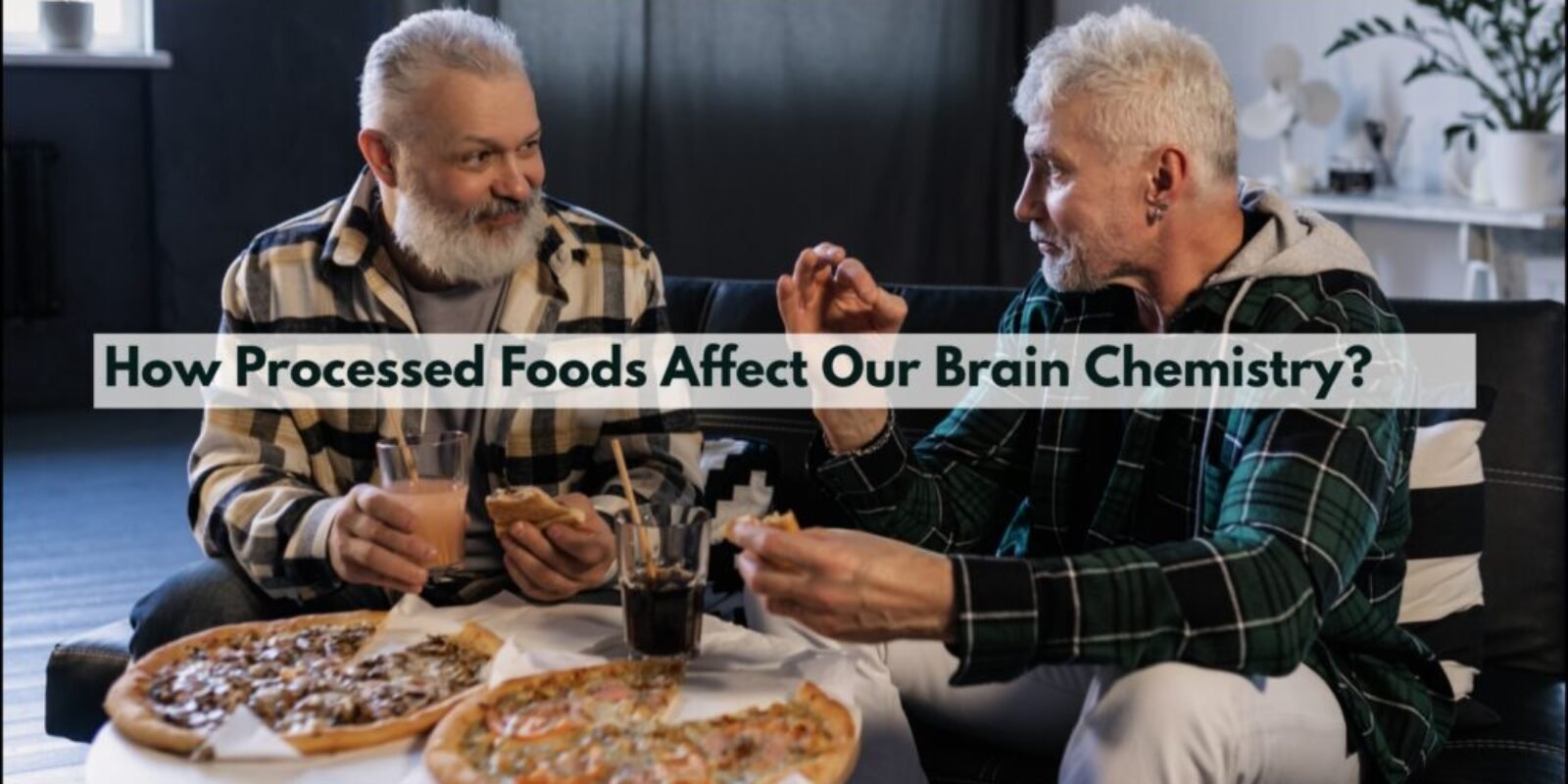We all know that most processed foods are not the healthiest option for our bodies, but do you know that they can also have a negative impact on your mental health? It’s true. These foods that fill our grocery stores and fast-food restaurants are often filled with ingredients that can wreak havoc on our brains.
In this article, we’ll explore the surprising connection between processed foods and mental health and what you can do to improve your well-being.
But First, the Good, the Bad and the Ugly!
They are certainly convenient. And they are usually (very deliberately) palate-pleasing with enhanced flavours and textures. But are all such foods unhealthy?
The simple answer is ‘no’. Some processed foods make our life simpler while still being highly nutritious. Frozen vegetables, plain yoghurts, canned tomatoes and beans are good examples – although the last two may be high in salt.
Prefer to listen rather than read?
The foods we are writing about here are those that contain ingredients that would never be found naturally in foods. Obvious examples are:
- High-fructose corn syrup
- Hydrogenated oils
- Artificial sweeteners and
- Artificial colours and flavours
“They are made, by design, for overconsumption,” says says Eduardo A.F. Nilson of the Center for Epidemiological Research in Nutrition and Public Health at the University of São Paulo, who has done extensive research on the subject. “They have hyper-palatability. We say they have hyper-flavors. They will be very sweet, very salty.”
But look at the label. How many of the ingredients are hard to pronounce? That is a good indication of the level of processing. When you can recognise everything on that label, you’re holding a portion of food that is both healthy and convenient even though it is processed. It’s the foods with additives that can and do impact our general health and well-being that you need to be aware of and also of the impact they can have…
How Do Processed Foods Affect Our Brain Chemistry?
By some estimates, human beings have been processing food for nearly 300,000 years. The earliest means by which we processed food was also the simplest: cooking. Our ancestors first devised this process in the primeval savannah, mainly to make food digestible and safe.
Since then, we have slaughtered, dressed, dried, salted, smoked, roasted, and steamed all the meats, fish, fowl, fruits, and vegetables we can gets our hungry hands on. In fact, we have butchered, diced, sliced, and processed just about anything edible on this planet.
Obviously, the purpose of food processing has changed over millennia. Today, quick convenience reigns among consumers looking for a fast, filling, and delicious meal.
The trend emerged in the 1950s. As more housewives entered the workforce after World War II, they had less time for traditional home cooking, which typically involves longer preparation times and more complex recipes.
So, housewives and working mothers in the 1950s began to choose fast and affordable meals when feeding their families.
Today’s highly processed foods are “made mostly or entirely from substances derived from foods and additives,” says a commentary published in the journal Public Health Nutrition in 2017.
These additives are ingredients not usually used in home cooking. They include monosodium glutamate, emulsifiers, and thickeners, among others. Ultra processed foods also have a much lower nutrient density than food prepared at home.
Yet these foods remain immensely popular. There is little doubt that at least some of their popularity can be attributed to advertising.
US food companies alone spent about $8.8 billion on advertising for processed food such as soda, fast food, and highly processed snacks in 2017.
This might at least explain part of the reason why, despite the warnings of public health advocates and institutions like the World Health Organization and the Food and Agriculture Organization (FAO), people throughout the world continue to consume vast amounts of highly processed foods each year.
More than half of the calories in the typical American adult’s diet can be traced back to highly processed foods. Nearly half of what Australians eat every day is highly processed and high in salt, sugar, and fat.
“People are tending to increasingly turn to ultra-processed foods,” says Melanie Grice, spokesperson for the Dietitians Association of Australia. “It’s mainly due to convenience; people don’t have time to cook anymore.”
Unhealthy – if not harmful – diets consisting of large quantities of processed foods, fats, and sugars drive an enormous cost of around $10 trillion a year on worldwide human health and the environment, says a report issued by the FAO in late 2023.
More recent studies reveal yet another negative consequence to the consumption of these often delicious, always convenient foods. They affect our minds, as well.
The consumption of processed foods may adversely affect our brain chemistry as a result of the additives they contain. These additives can destabilize the balance of neurotransmitters in our brains, resulting in symptoms such as depression, anxiety and mood swings. Furthermore, the consumption of these foods can activate inflammation throughout the body, which may worsen pre-existing mental health problems.

Why the Consumption of Highly Processed Food Continues to Grow
Most seniors realize that a nutritious diet leads to a healthy, vigorous life. But problems may sometimes arise because many of today’s older generations grew up during a time when most of the food people ate came from the farm.
For people of those earlier generations, negotiating the dizzying range of processed food on the shelves of the nearby grocery store can be quite a challenge.
This is particularly true because many food processing companies today advertise their products as healthy, even though much of the food they sell are in no way good for you.
Food labels are often confusing. Processed food manufacturers want to sell their products. Many have made a regular practice of labeling their processed food products with various health claims.
For example, they might label their processed food as “naturally sweetened,” “sugar-free,” and “low-fat.”
Unlike unprocessed foods – such as fresh eggs, fresh fruit, and fresh vegetables- which find their way from the farm to your kitchen practically unchanged, manufacturers deliberately alter the appearance and taste of highly processed food.
By the time these products land on grocery shelves, they will have gone through a conveyor belt of treatment and transformation. The manufacturers will have also enhanced the product with additives designed to make them taste better, last longer, and look more pleasing.
This would be all well and good were it not for the fact some of these processed food products are so unhealthy they can sometimes kill you over the long term.
A study published by the American Journal of Preventive Medicine in 2022 says that ultra-processed food likely contributed to 10 percent of the deaths among people aged 30 to 69 years old in Brazil in 2019.

Here are some of the ways these foods affect our brain chemistry, in particular:
- Changes in hormone levels due to processed foods
- Impact on neurotransmitter production
- Increased inflammation in the brain
- Altered nutrient absorption
- Disruption of hunger signals
These foods are often high in artificial flavours, preservatives, and other chemicals that can interfere with the natural functioning of our brains. These chemicals can disrupt the production and regulation of neurotransmitters, which are responsible for transmitting messages between nerve cells. As a result, the delicate balance of our brain chemistry can be thrown off, leading to a range of symptoms that affect our mood, emotions, and overall well-being.
The Link Between Processed Foods and Mental Health Disorders
As our understanding of the mind-body connection deepens, it has become increasingly clear that the foods we eat can have a significant impact on our mental health. In particular, there is growing evidence that these foods may contribute to the development and exacerbation of various mental health disorders, such as anxiety and depression.
How Are These Foods Linked to Depression?
The consumption of these types of foods has considerably increased in recent times, leading to a higher incidence of depression. There’s no doubt that these foods are attractive due to their cost-effectiveness and availability in contrast to fresh, unprocessed foods. However, they are deficient in nutrition and have adverse effects on our emotional well-being.
Moreover, the consumption of these foods has been linked to chronic inflammation in the body, which can exacerbate mental health issues such as anxiety and depression. Inflammation is the body’s natural response to injury or infection, but when it persists over time, it can lead to a range of health problems. In particular, chronic inflammation has been linked to an increased risk of mental health disorders, including depression and anxiety.
Processed Foods Cause Mood Swings
These foods can cause mood swings due to their high levels of sugar, caffeine, and other stimulants that can result in fluctuations in our moods. These foods can also disrupt the balance of neurotransmitters in the brain, further exacerbating mood swings.
These often contain high amounts of sugar, unhealthy fats, and artificial additives that can lead to depression. Consuming sugar, specifically, can have a noteworthy effect on mood and mental health. Once sugar is consumed, blood sugar levels increase rapidly, causing a short-term energy and mood boost. However, this is frequently followed by a decrease that may cause fatigue, irritability, and a low mood.
Its Role in Anxiety Disorders
Processed foods have been found to have a significant impact on our mental health, including contributing to the development and exacerbation of anxiety disorders. One of the primary ways that these foods can contribute to anxiety is through the presence of caffeine and other stimulants.
Caffeine is a central nervous system stimulant that can increase heart rate, blood pressure, and levels of stress hormones such as cortisol. Consuming high levels of caffeine, as found in these foods and beverages, can lead to feelings of nervousness, jitteriness, and anxiety. Caffeine can also interfere with sleep patterns, which can further exacerbate anxiety symptoms.
These chemicals can overstimulate the nervous system and trigger feelings of anxiety and agitation. Some individuals may also be sensitive to these chemicals and experience more pronounced symptoms of anxiety after consuming processed foods.
Processed Foods and ADHD
Research has shown that there is a link between these types of foods and Attention Deficit Hyperactivity Disorder (ADHD). Children who consume a diet high in these types of foods are more likely to experience symptoms of ADHD. These foods can disrupt the natural balance of neurotransmitters in the brain. This imbalance can lead to hyperactivity and impulsivity, two key symptoms of ADHD.

Neurotransmitters are chemicals that transmit signals between neurons and are crucial for proper brain function. Specifically, the balance of dopamine, norepinephrine, and serotonin – three neurotransmitters that are particularly important in regulating mood, attention, and behaviour – can be disrupted by the consumption of these foods.
When the balance of these neurotransmitters is disrupted, it can lead to hyperactivity and impulsivity, two key symptoms of ADHD. Hyperactivity is characterized by excessive physical activity, fidgeting, and restlessness, while impulsivity is characterized by acting without thinking, interrupting others, and making rash decisions.
The impact of these types of foods on cognitive function has become a growing concern in recent years. These foods can lead to chronic inflammation and oxidative stress, which are believed to contribute to cognitive decline and an increased risk of developing neurological disorders like Alzheimer’s disease and dementia.
The Impact of Processed Foods on Cognitive Function
In fact, a study published in the medical journal, Neurology, in 2022 concludes that a 10 percent increase in ultra processed food consumption raises the risk of dementia in later life.
In addition to the potential long-term effects on cognitive function, studies have also shown that these foods can have an immediate impact on our ability to think, reason, and remember.
Processed Foods and Insomnia
Insomnia, or difficulty falling or staying asleep, is a common problem that affects many people worldwide. While there are many factors that can contribute to insomnia, including stress, anxiety, and certain medications, diet also plays a significant role.
Highly processed foods, in particular, have been shown to contribute to insomnia in several ways.
One of the main ways that these types of foods can contribute to insomnia is through their high sugar content. Foods high in sugar, such as candy, soda, and baked goods, can cause a rapid spike in blood sugar levels, followed by a crash.
This fluctuation in blood sugar levels can disrupt the body’s natural sleep-wake cycle, making it harder to fall asleep and stay asleep.

These foods can also contain additives like caffeine and other stimulants that can interfere with sleep. Caffeine is a known stimulant that can keep you awake and alert for hours, even if consumed several hours before bedtime. According to the American Academy of Sleep Medicine, caffeine’s half-life is up to 5 hours. That means that after 5 hours, your body may still be retaining half of the caffeine you consumed.
Additionally, many processed foods are high in sodium, which can increase blood pressure and make it harder to fall asleep.
The American Heart Association recommends that adults consume no more than 2,300 milligrams (mg) of sodium per day, which is about one teaspoon of salt.
However, the ideal amount of sodium intake varies depending on age, sex, and overall health. People with high blood pressure or other health conditions may need to consume less sodium. It is important to talk to your doctor about the right amount of sodium for you.
Since so many of the foods we eat are boosted with salt – from bread and cereal to canned products and even drinks and ice cream, it’s not uncommon for someone to consume dangerously high amounts of salt.
The Link Between Processed Foods and Stress
These foods can also contribute to stress. Consuming these foods can contribute to a spike in blood sugar levels, which can ultimately cause an increase in cortisol, also known as the stress hormone.
Cortisol is responsible for regulating our body’s response to stress, but when levels remain elevated for a prolonged period, it can lead to anxiety, depression, and other mental health issues.
Furthermore, these foods often lack the essential nutrients, vitamins, and minerals that our bodies need to function optimally. This can lead to a weakened immune system, fatigue, and other physical symptoms that can trigger stress.
Additionally, the preservatives and additives used in these foods can disrupt our gut microbiome, which has been linked to anxiety and depression.
Worsen Symptoms of PTSD
Processed foods can worsen symptoms of PTSD. These foods can disrupt the balance of neurotransmitters in the brain, which can make it difficult for people with PTSD to regulate their emotions.
Furthermore, these foods can also disrupt the gut-brain axis, which is the communication pathway between the gut and the brain. The gut microbiome, which is made up of trillions of microorganisms that live in the digestive tract, plays a crucial role in regulating mood, stress, and anxiety.
Consuming processed foods that are low in fibre and high in additives can disrupt the balance of the gut microbiome, leading to dysregulation of the gut-brain axis and worsening the symptoms of PTSD.
The Role of Processed Foods in Addiction
These foods have been shown to have a potential link to addiction. As already covered, they often contain high amounts of sugar, salt, and unhealthy fats, which can lead to cravings and overeating. These foods are designed to be highly palatable and easy to consume, making it difficult for individuals to resist them.
Furthermore, these foods contain additives such as high fructose corn syrup, artificial flavours, and preservatives, which have been shown to have a similar effect on the brain as drugs and alcohol. These additives can activate the brain’s reward system, leading to feelings of pleasure and craving, and ultimately, addiction.
Research has found that individuals who consume a diet high in these kinds of foods are more likely to develop addictive eating behaviours. These behaviours can lead to negative consequences such as weight gain, obesity, and other health problems.
How to Improve Mental Health by Reducing Processed Foods?
To enhance your mental health, it’s advisable to cut down on processed foods and concentrate on consuming whole, nutrient-rich foods such as fruits, vegetables, whole grains, and lean proteins. Steer clear of foods that contain high amounts of sugar, unhealthy fats, and additives. Doing so can help bolster your brain chemistry and enhance your mental health.
Adding natural food supplements can also help your body fend off diseases while keeping you physically and mentally healthy. Look for supplements that provide vitamins and minerals from natural food sources only.

Processed foods can negatively affect our mental health despite being convenient and delicious. Understanding the link between processed foods and mental health empowers us to make informed dietary choices. Prioritizing nutrient-rich, whole foods is key to promoting brain chemistry, enhancing mental wellness and helping seniors to continue to lead a happy, healthy, fulfilling life.
FAQ: Processed Foods and Mental Health
- Does the study on ultra-processed foods establish a cause-and-effect relationship between diet and mental health conditions?
- The study does not establish a direct cause-and-effect relationship between consuming ultra-processed foods and mental health conditions like depression and anxiety.
- It identifies a correlation but does not confirm that one causes the other. Individuals with existing mental health issues may consume more ultra-processed foods, making causality unclear. Further research with controlled variables and long-term data is necessary to determine definitive conclusions.
- How can people with and without Down syndrome promote their mental health?
- Promoting mental health involves addressing physical health, maintaining regular check-ups, and ensuring timely treatment for any issues. A consistent sleep routine and a calming bedtime environment contribute to mental clarity and emotional balance.
- Physical activity, such as walking or swimming, combined with a balanced diet rich in nutrients, supports both body and mind. Social engagement, like forming strong relationships or joining community groups, enhances emotional well-being, benefiting everyone regardless of life circumstances.
- What mental health conditions are more common in individuals with Down syndrome compared to those without?
- Individuals with Down syndrome often face a higher prevalence of mental health conditions such as depression and anxiety, which can greatly affect their daily lives. Obsessive-compulsive disorder (OCD), involving intrusive thoughts and repetitive behaviors, is also common.
- Some mental health issues may arise from physiological factors related to the genetic nature of Down syndrome. Recognizing and addressing these challenges is essential for providing effective care and fostering well-being.
- Where can one find more information on mental health, nutrition, and physical activity related to Down syndrome?
- Individuals with Down syndrome face unique mental health challenges, including a higher prevalence of conditions like depression, anxiety, and OCD, often linked to genetic and physiological factors. Promoting mental well-being for everyone involves regular physical activity, balanced nutrition, social engagement, and consistent sleep routines.
- Resources like videos, infographics, articles, and presentations provide tailored insights into mental health, diet, and exercise for individuals with Down syndrome. These tools and strategies offer a foundation for improving overall health, supporting independence, and enhancing quality of life.
- What mental health issues were linked to the consumption of these foods?
- Participants who consumed more ultra-processed foods reported a higher likelihood of experiencing mild depression, an increase in “mentally unhealthy days,” and more frequent “anxious days.”
- What types of foods were examined in the research?
- The research analyzed the impact of ultra-processed foods, including items like sugary drinks and packaged snacks.
Disclaimer
The content provided on MySeniors.World is for informational purposes only and is not intended as either financial or medical advice. Always consult a qualified professional before making any investment or health-related decisions.
Posts may contain affiliate links, meaning we earn a commission – at no additional cost to you, if you click through and make a purchase. Your support helps us continue providing valuable content.



















